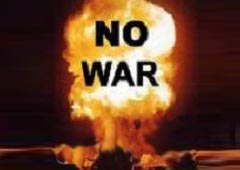standing under the logo of Mojahedin Khalq to lobby for war
When we mark the grim 10-year anniversary of the U.S. invasion of Iraq next Tuesday, most Americans will be 
What they won’t be doing is hoping for an anniversary gift from the people who got us into that war.
But Jeff Sessions (R-AL), Chuck Schumer (D-NY), and many of their Senate colleagues are busy wrapping up the perfect gift for a country who has been through everything: a new war of choice in the Middle East with Iran.
Senator Sessions recently addressed an audience on Capitol Hill at an event organized by affiliates of the Mujahedin-e Khalq, a radical Iranian exile group that was considered a terrorist organization by the U.S. until late last year. Sessions told the audience that, if President Obama took military action against Iran, "he would have great support in the Congress." He received not one but two standing ovations for his remarks. What he didn’t mention was that military officials believe a war to end Iran’s nuclear program would means "tens of years" of occupation and would make Iraq look like a cakewalk in comparison.
Meanwhile, the Senate is moving forward with an unprecedented resolution calling for the U.S. to provide support for Israeli strikes on Iran in the form military, economic, and diplomatic backing. The resolution, S.Res.65, is rightly being called a backdoor to war with Iran — a convenient way to plunge the U.S. into war without a messy public debate but instead automatically, based on when Israel Prime Minister Netanyahu decides to pull the trigger.
Senator Schumer, an original cosponsor of the resolution, defended his support for declaring preemptive U.S. backing for a preventive Israel-led war on Iran by offering an argument so riddled with intelligence falsehoods that it would have made George W. Bush blush.
In a letter to constituents, Schumer asserted that the Senate measure is necessary because Iran "continues to enrich uranium into weapons-grade nuclear materials in violation of United Nations resolutions" and that "experts say that the type of fuel that they produce is sufficient to arm a nuclear warhead."
I don’t know who are these "experts" that Senator Schumer is talking to, but they don’t include the U.S. Director of National Intelligence James Clapper. Clapper was on the Hill just this week testifying in the Senate about how Iran is still not enriching to weapons grade and has still not made a decision to build a nuclear weapon. Clapper also told senators that, if Iran did make a move to enrich to weapons grade, we would be able to detect it quickly.
The "experts" Schumer is talking to don’t just ignore the U.S. intelligence community, they also apparently don’t think much of intelligence agencies in Israel or any of the UN Security Council states, or the inspectors at the International Atomic Energy Agency who monitor Iran’s nuclear sites. All of these experts are in firm agreement: Iran is not enriching to weapons grade; Iran does not have materials to load into a nuclear warhead; and, just to be clear, Iran would still be years away from being able to assemble and deploy such a warhead.
The overwhelming consensus of these basic facts notwithstanding, there are, of course, real concerns about Iran’s nuclear intentions. Which is exactly why the Obama Administration is pursuing verifiable caps on Iran’s enrichment through negotiations. Securing such limits on Iran’s nuclear work would be a significant but achievable diplomatic accomplishment, and will take time. But the effort is beginning to showing progress, which is why The New York Times — no dove during the Iraq war push — called out Congress and the "pro-Israel" lobby AIPAC for pushing measures like S.Res.65 and new sanctions. The Times warns that these measures threaten to upend negotiations, fracture international efforts, and make war more likely. It is clear that some have actually learned the costly lessons from Iraq over the past decade.
While in the buildup to Iraq, the intelligence was being politicized from the inside; in the buildup to Iran, the intelligence is being politicized from outside. Leading up to the Iraq invasion, it was the White House that was heading up the effort to twist the intelligence and selling a public campaign reflecting an imagined reality based on suspicions and ideological agendas. It was Congress that eventually went along for the ride. But what we are seeing now from the intelligence community and the White House is the opposite — a sober, reality-based analysis of Iran’s nuclear program and capabilities, and a serious effort to utilize negotiations to avoid a disastrous war. Instead, it is lobby groups like AIPAC and a broken Congress who are helping dismantle diplomatic options, distorting the intelligence and building up the campaign for war.
If senators cannot be bothered to adhere to the most basic facts about the Iranian nuclear program, it is of little surprise they are okay with outsourcing the decision to go to war with Iran to Israel. But as we reflect on the past decade, the most important way that we can mark this grim anniversary is to make sure we never repeat the mistake of Iraq again and that our elected officials don’t take us into war with Iran.
By Jamal Abdi,



